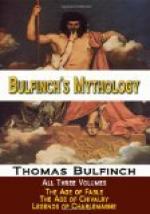forward. And the hoary-headed man led the way
into the hall. And in the hall he dismounted,
and he left there his horse. Then he went on
to the upper chamber with the hoary-headed man.
And in the chamber he beheld an old woman, sitting
on a cushion, with old, worn-out garments upon her;
yet it seemed to him that she must have been comely
when in the bloom of youth. And beside her was
a maiden, upon whom were a vest and a veil that were
old and beginning to be worn out. And truly he
never saw a maiden more full of comeliness and grace
and beauty than she. And the hoary-headed man
said to the maiden, “There is no attendant for
the horse of this youth but thyself.” “I
will render the best service I am able,” said
she, “both to him and to his horse.”
And the maiden disarrayed the youth, and then she
furnished his horse with straw and corn; and then
she returned to the chamber. And the hoary-headed
man said to the maiden, “Go to the town and bring
hither the best that thou canst find, both of food
and of liquor.” “I will gladly, lord,”
said she. And to the town went the maiden.
And they conversed together while the maiden was at
the town. And, behold, the maiden came back,
and a youth with her, bearing on his back a costrel
full of good purchased mead, and a quarter of a young
bullock. And in the hands of the maiden was a
quantity of white bread, and she had some manchet
bread in her veil, and she came into the chamber.
“I would not obtain better than this,”
said she, “nor with better should I have been
trusted.” “It is good enough,”
said Geraint. And they caused the meat to be boiled;
and when their food was ready, they sat down.
And it was in this wise. Geraint sat between
the hoary-headed man and his wife, and the maiden
served them. And they ate and drank.
And when they had finished eating, Geraint talked
with the hoary-headed man, and he asked him in the
first place to whom belonged the palace that he was
in. “Truly,” said he, “it was
I that built it, and to me also belonged the city
and the castle which thou sawest.” “Alas!”
said Geraint, “how is it that thou hast lost
them now?” “I lost a great earldom as
well as these,” said he, “and this is
how I lost them. I had a nephew, the son of my
brother, and I took care of his possessions; but he
was impatient to enter upon them, so he made war upon
me, and wrested from me not only his own, but also
my estates, except this castle.” “Good
sir,” said Geraint, “wilt thou tell me
wherefore came the knight and the lady and the dwarf
just now into the town, and what is the preparation
which I saw, and the putting of arms in order?”
“I will do so,” said he. “The
preparations are for the game that is to be held to-morrow
by the young earl, which will be on this wise.
In the midst of a meadow which is here, two forks will
be set up, and upon the two forks a silver rod, and
upon the silver rod a sparrow-hawk, and for the sparrow-hawk
there will be a tournament. And to the tournament




